 W
WThe Tiananmen Square protests or the Tiananmen Square Incident, commonly known as the June Fourth Incident in mainland China, were student-led demonstrations held in Tiananmen Square in Beijing during 1989. The popular national movement inspired by the Beijing protests is sometimes called the '89 Democracy Movement. The protests started on April 15 and were forcibly suppressed on June 4 when the government declared martial law and sent the People's Liberation Army to occupy parts of central Beijing.
 W
WThe 20th anniversary of Tiananmen Square protests of 1989 (20周年六四遊行) was a series of rallies that took place in late May to early June 2009 to commemorate the 20th anniversary of 4 June Tiananmen Square protests of 1989, during which the Chinese government sent troops to suppress the pro-democracy movement. While the anniversary is remembered around the world; the event is heavily censored on Chinese soil, particularly in Mainland China. Events which mark it only take place in Hong Kong, and in Macao to a much lesser extent.
 W
WThe 21st anniversary Tiananmen square incident march began as a small march to commemorate the 4 June Tiananmen Square protests of 1989 in Hong Kong. Hong Kong and Macau are the only places on Chinese soil where the 1989 crushing of China's pro-democracy movement can be commemorated, and the annual event to commemorate has been taking place in Hong Kong since 1990.
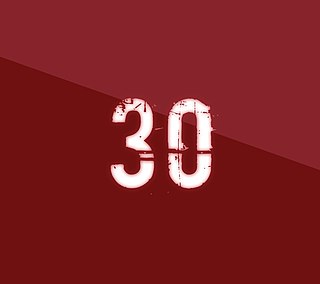 W
WThe 30th anniversary of Tiananmen Square protests of 1989 was principally events that occurred in China and elsewhere on and leading up to 4 June 2019 – to commemorate the Chinese Communist Party's crackdown on the Tiananmen Square protests of 1989 in which hundreds of people were killed.
 W
WAlmost a Revolution is an autobiography by Shen Tong (沈彤), one of the student leaders in the Tiananmen Square Protests of 1989 in Beijing, China, written with former The Washington Post writer Marianne Yen.
 W
WBeijing Coma is a 2008 novel by Ma Jian. It was translated from Chinese by Flora Drew. The Chinese government has since banned the book. Ma has stated that he wrote the book "to reclaim history from a totalitarian government whose role is to erase it" and named the novel Beijing Coma in reference to this. Beijing Coma was nominated in 2009 for the Man Booker Prize and is one of The New York Times "100 Notable Books of 2008".
 W
WChen Xitong was a member of the Politburo of the Communist Party of China and the Mayor of Beijing until he was removed from office on charges of corruption in 1995.
 W
WPrior to the Chinese Student Protection Act of 1992 (CSPA), President George H.W Bush issued Executive Order 12711 in 1990. This policy implementation was solidified by the actual Act in 1992. The Act's main sponsors were Nancy Pelosi (D-CA) for the House of Representatives and Senator Slade Gorton (R-WA) for the Senate. The Chinese Student Protection Act of 1992 was passed on May 21, 1992 by the Senate, and passed by the House of Representatives on August 10, 1992. President George H. W. Bush signed it into law on October 9, 1992. The Chinese Student Protection Act became Public Law 102-404, 106 Stat. 1969.
 W
WOn June 9, 1989, Chinese leader Deng Xiaoping delivered what was officially termed his "Speech Made While Receiving Cadres of the Martial Law Units in the Capitol [sic] at and Above the Army Level". It was his only public speech on the Tiananmen Square protests of 1989, following the army's intervention and use of force on the student-led protests on June 4. Portions of the speech aired on the CCTV program Xinwen Lianbo on that same evening. The speech was delivered to a group of People's Liberation Army generals in Beijing. It set the defiant tone for the Chinese leadership that the army's use of force was fully justified, demonstrated that Deng was still firmly in charge of China, quelled rumours of impending civil war, and signaled that China's economic reforms would continue as planned.
 W
W"Descendants of the Dragon", also translated as "Heirs of the Dragon", is a Chinese song written by Hou Dejian. The song was first recorded and released by Lee Chien-Fu, and Hou himself also recorded the song. It has been covered by other artists, including Lee's nephew Wang Leehom. The song became an anthem in the 1980s, and it is commonly regarded as a patriotic song that expresses sentiments of Chinese nationalism.
 W
WExecution is a 1995 painting by Chinese artist Yue Minjun. The piece was inspired by the Tiananmen Square protests of 1989, although the artist stated through translation that the art should not be viewed as depicting what happened at Tiananmen Square. In 2007 it became the most expensive work sold by a Chinese contemporary artist.
 W
WThe Goddess of Democracy, also known as the Goddess of Democracy and Freedom, the Spirit of Democracy, and the Goddess of Liberty, was a 10-metre-tall (33 ft) statue created during the 1989 Tiananmen Square protests. The statue was constructed over four days out of foam and papier-mâché over a metal armature. The constructors decided to make the statue as large as possible to try to dissuade the government from dismantling it: the government would either have to destroy the statue—an action which would potentially fuel further criticism of its policies—or leave it standing. Nevertheless, the statue was destroyed on June 4, 1989, by soldiers clearing the protesters from Tiananmen square. Since its destruction, numerous replicas and memorials have been erected around the world, including in Hong Kong, San Francisco, Washington, D.C., and Vancouver.
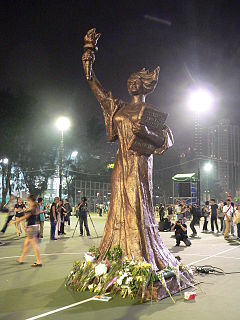 W
WHong Kong's Goddess of Democracy is a 6.4-metre faux bronze statue sculpted by Chen Weiming, inspired by the original 10-metre tall Goddess of Democracy. The original foam and papier-mâché statue was erected by the Chinese pro-democracy movement in Tiananmen Square at the end of May 1989, and destroyed by soldiers clearing the protesters from Tiananmen square on June 4, 1989.
 W
WThe Hong Kong Alliance in Support of Patriotic Democratic Movements of China is a democratic organization that was established on 21 May 1989 in the then British colony of Hong Kong during the demonstration for the students protest in Tiananmen Square in Beijing. After the 4 June massacre, the organisation main goals are the rehabilitation of the democracy movement and the accountability for the massacre. The main activities the organisation holds are the annual memorials and commemorations, of which the candlelight vigil in Victoria Park is the most attended, reported and discussed event each year. Due to its stance, the Central government in Beijing considers the organisation subversive.
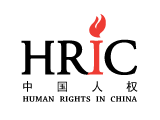 W
WHuman Rights in China is a New York-based international, Chinese, non-governmental organization with intentions to promote international human rights and facilitate the institutional protection of these rights in the People's Republic of China. HRIC is a member organization of the International Federation for Human Rights. According to Fang Lizhi, HRIC is committed to an independent, non-political, and intelligent approach
 W
WThe June 4th Museum, organised by the Hong Kong Alliance in Support of Patriotic Democratic Movements in China, is a museum commemorating the Tiananmen Square protests of 1989 that occurred in Beijing, China.
 W
WLan Yu is a 2001 gay-themed Hong Kong-Mainland Chinese film set in Beijing by Hong Kong director Stanley Kwan.
 W
WLiang Guanglie is a retired general and former Minister for National Defense in the People's Republic of China.
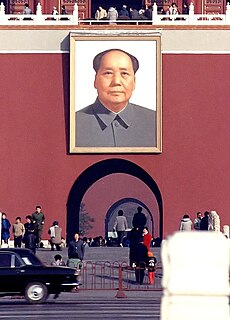 W
WDuring the Tiananmen Square protests of 1989, the portrait of Mao Zedong at Tiananmen was defaced. At 2:00pm, May 23, 1989, three young protesters from Liuyang, Hunan, posted banners on the wall of the Tiananmen gate's passway. The slogans on the banners read, Time to End the Five Thousand Years of Autocracy and Time to End the Cult of Personality. Shortly after, they threw eggs filled with pigment to the Portrait of Mao Zedong on the Tiananmen Gate. They were immediately caught by members of the Beijing Students' Autonomous Federation. At 5:00pm, they were forced to appear in a press conference and admitted that their activities were totally irrelevant with Movement. At 7:00pm, they were handed to Beijing Municipal Public Security Bureau. On a TV program broadcast the same day, members of the Movement claim that they had nothing to do with the three youths, and criticized them. At 10:00pm, the defaced portrait of Mao Zedong was taken down and replaced by a spare.
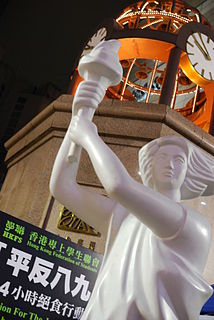 W
WIn the days following the end of the 1989 Tiananmen Square protests, several memorials and vigils were held around the world for those who were killed in the demonstrations. Since then, annual memorials have been held in places outside of Mainland China, most notably in Hong Kong, Taiwan and the United States.
"Nothing to My Name" is a 1986 Mandarin-language rock song by Cui Jian. It is widely considered Cui's most famous and most important work, and one of the most influential songs in the history of the People's Republic of China, both as a seminal point in the development of Chinese rock music and as a political sensation. The song was an unofficial anthem for Chinese youth and activists during the Tiananmen Square protests of 1989.
 W
WPrisoner of the State: The Secret Journal of Premier Zhao Ziyang are the memoirs of the former General Secretary of the Communist Party of China, Zhao Ziyang, who was sacked after the Tiananmen Square protests in 1989. The book was published in English in May 2009, to coincide with the twentieth anniversary of the clearing of the square by tanks on June 4, 1989. It is based on a series of about thirty audio tapes recorded secretly by Zhao while he was under house arrest in 1999 and 2000.
 W
WQuelling the People: The Military Suppression of the Beijing Democracy Movement is a history book which investigates the conflict between the Chinese democracy movement in Beijing, China and the communist-ruled Chinese state's People's Liberation Army, culminating in the confrontation between the citizens of Beijing and the People's Liberation Army at Tiananmen Square in June 1989.
 W
WSummer Palace, is a 2006 Chinese film and the fourth feature film by director Lou Ye. The film was a Chinese-French collaboration produced by Dream Factory, Laurel Films, Fantasy Pictures and Sylvain Bursztejn's Rosem Films. It was made in association with France's Ministère de la Culture et de la Communication, Ministère des Affaires Étrangères and Centre National de la Cinématographie (CNC). The film is the first from mainland China to feature the full-frontal adult nudity of both its male and female leads, though earlier films such as Xiao Wu (1998), Lan Yu (2001), Green Hat (2003), and Star Appeal (2004), have featured full-frontal adult male nudity.
 W
WTank Man is the nickname of an unidentified Chinese man who stood in front of a column of tanks leaving Tiananmen Square on June 5, 1989, the day after the Chinese military had suppressed the Tiananmen Square protests. As the lead tank maneuvered to pass by the man, he repeatedly shifted his position in order to obstruct the tank's attempted path around him. The incident was filmed and shared to a worldwide audience. Internationally, it is considered one of the most iconic images of all time. Inside China, the image and the accompanying events are subject to censorship even though it displays the lead tank commander's mentality of avoiding injuring any non violent civilians.
 W
W"Tin Omen" is a single by the band Skinny Puppy, taken from their 1989 album Rabies. The song name is a reference to the 1989 Tiananmen uprising and massacre in China. The song also refers to the My Lai massacre of 1968, and the Kent State shootings of 1970.
 W
WYan Jiaqi is a Chinese political scientist and dissident.
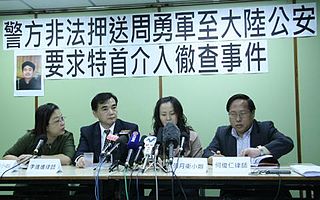 W
WThe Zhou Yongjun incident was a political controversy which involved the rendition of Zhou Yongjun (周勇军), a former student activist during the Tiananmen Square protests of 1989, by the Hong Kong authorities to the People's Republic of China. Zhou attempted to enter Hong Kong from the United States via Macau using a forged Malaysian passport. Zhou's supporters alleged the renditioning to be illegal, and his lawyer, Democratic Party chairman Albert Ho, described Zhou's case as "posing the biggest challenge to the one country, two systems principle laid down in the Basic Law." The Government of Hong Kong refused to comment on individual cases, and the People's Republic of China said Zhou was detained on several charges, including one of financial fraud.